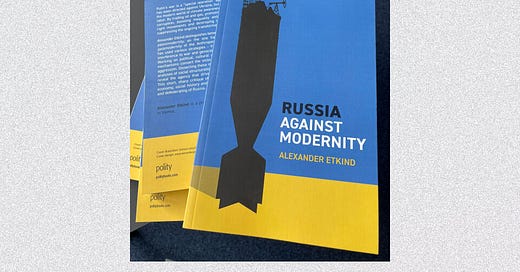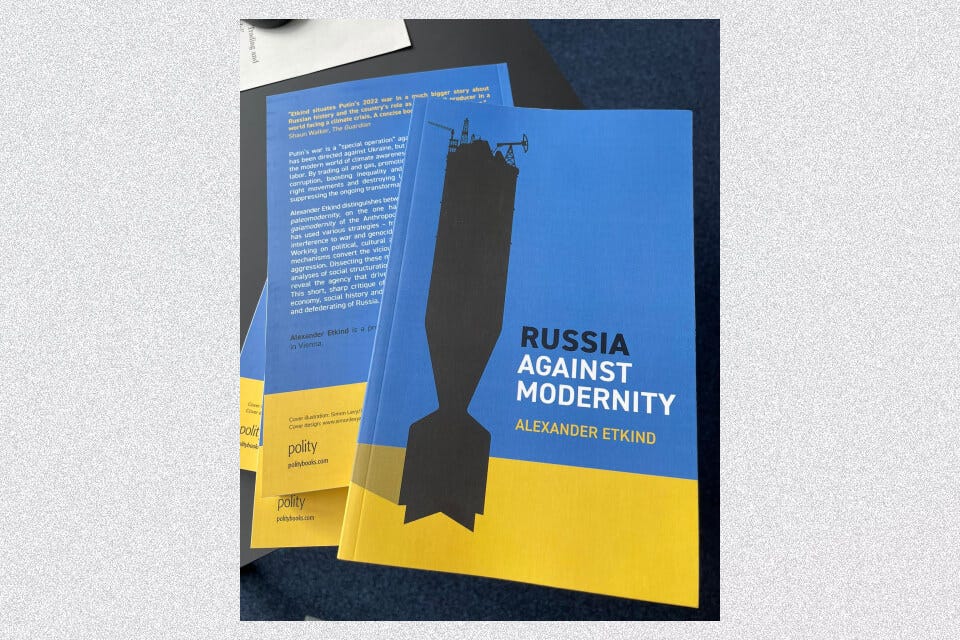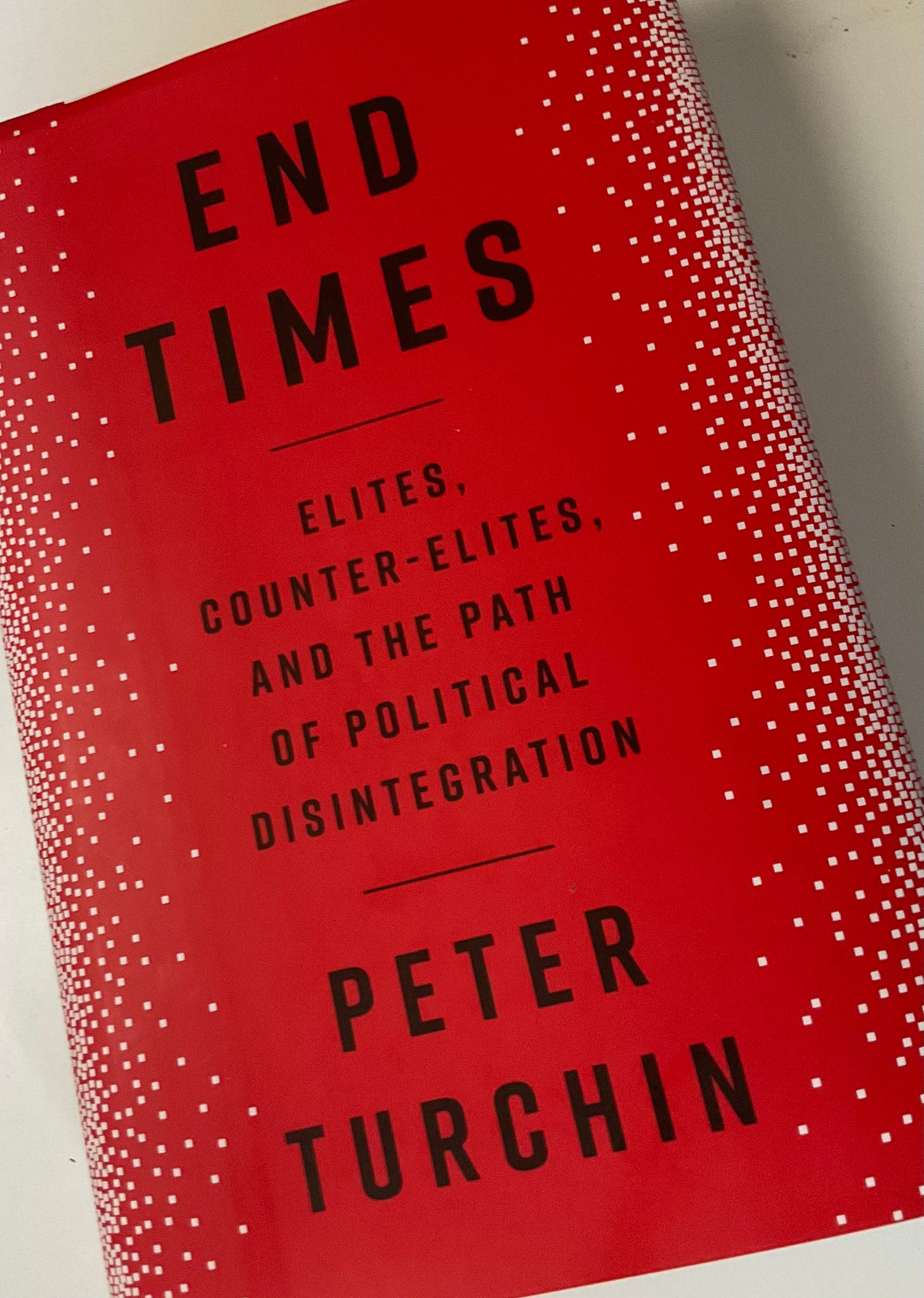28 June 2023. Russia | History
Russian and the war on the new modernity // Cliodynamics, psychohistory, and Peter Turchin’s ‘End Times’ [#472]
Welcome to Just Two Things, which I try to publish three days a week. Some links may also appear on my blog from time to time. Links to the main articles are in cross-heads as well as the story. A reminder that if you don’t see Just Two Things in your inbox, it might have been routed to your spam filter. Comments are open.
1: Russia and the war on the new modernity
I’m not going to add uninformed speculation here on the events in Russia at the weekend, although I liked John Mecklin’s description of them as “a stunning whiplash turn of only partly explained events”.
I also discovered among my open tabs a piece from three weeks ago by Nina Kruscheva at Project Syndicate which suggested she had been following closely some of the early indicators of the Wagner ‘mutiny’. She noted the interview with Wagner leader Prigozhin published on May 24th in which he observed that the “special military operation” had largely had the opposite effects from those intended:
Instead of denazifying Ukraine, he noted, Russia made it “world famous.” And far from “demilitarizing” Ukraine, Russia militarized it: “If (the Ukrainians) had 500 tanks before, now they have 5,000. If 20,000 fighters were skillful then, now it’s 400,000.”
But—as at the weekend—he didn’t blame Putin for this. Russia’s elites were responsible for this outcome:
Prigozhin pinned the blame squarely on Russia’s elites, particularly senior military leaders, accusing them of lack of commitment to the war… Prigozhin is not wrong to question the commitment of Russia’s elites to the war effort. Virtually the entire cabinet – including Defense Minister Sergei Shoigu, a favorite target of Prigozhin – would prefer to avoid further escalation, and the military may well be devising strategies to that end. This is a pragmatic decision. Most of Russia’s ruling class believe that it is hard for Russia to “win” the war.
Their view, according to Khruscheva, is that “(t)he more it fights the more Russia could turn into a kind of North Korea, a country willing to sacrifice everything – living standards, security, even sovereignty” in pursuit of Putin’s obsession with Ukraine. For his part Prigozhin would be fine with this outcome.
We had a lot of historical analogies at the weekend, but the comparison Khruscheva makes here is with Rasputin, the ‘mad monk’ who advised the Romanovs in the period before the Revolution. (You may, or not, play the Boney M song at this point.)1
Prigozhin is outside the system, but the system is what he serves… In both cases, the state lacked coherence, and the man in charge failed to display adequate leadership, even as he dispensed orders. Fringe elements emerged to fill the void, not by attempting to guess what the boss wanted and executing it, but by establishing themselves as forces to be reckoned with – all against a backdrop of popular fury.
—
(Contemporary cartoon satirising Rasputin’s influence over the Romanovs. Via Picryl. Public domain.)
Of course, as you’ll know if you played the Boney M song, this didn’t end well for anyone. Rasputin was murdered in 1916 by a group of nobles who decided that his influence on the royal family threatened the Empire. And the Russian state fell apart anyway.
This seems to be a link to the other interesting piece I found while researching—an interview with the Russian-born historian Alexander Etkind in Holod, an independent outlet that writes about Russia from outside of the country. Etkind sees the war in Ukraine as part of Russia’s war against “progress”, by which he means the ecological, social and cultural challenges of the 21st century.
Etkind has a book out called Russia Against Modernity where he develops this argument. His definition of modernity:
The new modernity is a direct response to the confrontation between society and nature. In earlier centuries, nature seemed endless—it could be explored and conquered. But now we have reached a dead end.
At one level, Russia is opposed to this ‘new modernity’ because its economy is dependent on the old version:
(I)ts economy is completely dependent on the export of its carbon-based materials, which are quite appropriately called fossil fuels. Any energy transition programs deprive the Russian Federation of its familiar sources of income.
This perhaps appears to reduce the war to a narrow fossil-fuel driven economism, although Etkind would say not. In practice the politics of Putin and his elite have a uniform dislike of all aspects of the new modernity—including environmental, health, social, gender, and cultural challenges. Etkind touches on these in the interview, but not in a very clear way:
In my book I have a chapter about how the personal preferences of politicians influence their decisions, simultaneously giving them the appearance of consistency. I describe how “taste preferences,” such as homophobia or preference for the big over the small, serve the function of political planning. So one taste-based decision leads to another, another to the third... but the path choice at each of these forks is driven by the same taste of the ruling clique.
Internally, these taste preferences lead to the close alliance with the Russian Orthodox Church:
(Patriarch) Kirill has also promoted an influential critique of Western liberalism, consumerism and individualism, contrasted with Russian “traditional values.” This idea argues that human rights are not universal, but a product of Western culture, especially when extended to LGBTQ people.
Parts of this agenda overlap with other right-wing leaders, notably around fossil-fuel, the denial of human rights, and gender politics, and—conversely—the promotion of the family. The American Republican Party is the jewel in this particular crown, says Etkind:
The most significant achievement for Putinism was the presidency of Donald Trump. It was the international victory of Putinism as a system of tastes and preferences, as a role model. The great country of America fell under the influence of Russia and voted for a Putinist.
But other leaders fall into the same space. It was striking that the very first speech that Erdogan made after being re-elected last month was described as being a “rant” about LGBT+ people. Erdogan has the same type of close alliance with a conservative religion that you see in Russian and the US GOP. Family got an aggressive namecheck, again familiar to anyone who listens to Republican candidates, in the same speech:
“In our culture, family is sacred. No one can interfere. We will strangle anyone who dares to touch it.”
When the New York Times referenced Etkind’s book in the last few days, it also noted the age difference between Russia’s leadership and that of the Ukraine:
Etkind depicts Putin’s invasion as “a war between generations,” noting that Ukraine’s cabinet is mostly made up of people under the age of 50, while most of Russia’s cabinet members are older.
Looked at through these lenses, the West’s support for the war—in terms of both materiel and emotion—make more sense. Because: it wasn’t clear, when Russian invaded, that NATO countries and others associated with the alliance, would be in it for the long haul. But the war is actually about the values shift we’re seeing in the richer world.
2: Cliodynamics, psychohistory, and Peter Turchin’s ‘End Times’
(Part 2 of my review of Peter Turchin’s book End Times. Part 1 was on Monday.)
In End Times, Peter Turchin takes his thinking about long waves of political, social, and economic change, or at least some of it, and packages it up, as if it is one of those Big Airport Books That Explains What Is Going On In The World. (Or more specifically, In America).
(Photo: Andrew Curry. CC NC-BY-SA 4.0)
In brief: a first section talks about elites and their over-production in the US, how that leads to crisis, and tries to contextualise that. A second section, also about the US, looks at the elements that create instability. A third section explores crisis, its aftermath, and possible futures. And an Appendix contains some background to the Cliodynamics approach (this might be subtitled, “I answer my critics and deal with some misconceptions.)
In his enthusiasm to popularise, I think Turchin has made some mistakes and fallen into some traps. The mistake is that —on my reading—I don’t see anywhere in the book where he explains the underlying model in any coherent form, narratively or diagrammatically. At worse, this could have gone into one of the three chapters in the Appendix section. I thought I might be being careless in my reading here, but this also frustrated Will Davies in his New Statesman review of the book. If you’re not familiar with the history of Turchin’s work, there seems to be less here than meets the eye.
The first trap is about claiming “prediction” rather than “projection” or “pattern”, even while putting cavets around it. It is noticeable to me that Carlota Perez, who has a similarly useful model about the interaction between finance and technology innovation, always insists that her model is not a law, and can only really be described as a heuristic.
This sometimes reminds me of Isaac Asimov’s “psychohistory”, and it’s hard to read the rationale for the (let’s face it, invented neologism) of “cliodynamics” without being reminded of Asimov. Turchin does discuss Asimov and psychohistory in the chapter on “the new science of history.”2
And as it happens, in one of the chapters in the Appendix, Turchin has a reasonably honest assessment of the limits of prediction that is hard to disagree with:
What Asimov did not know is that even if you can ignore such things as individual free will, you still run (up) against very strict limits to predictability. When components of a complex system interact nonlinearly, the resulting dynamics become effectively unpredictable, even if they are entirely deterministic... But this limitation on predictability is, paradoxically, a source of optimism. It means that human individuals are not as powerless as Asimov imagined them. Exercising one's free will can have major consequences at the macro level, just like a butterfly fluttering its wings can affect the course of a hurricane. (pp. 250-251)
The second trap, and perhaps this was at the suggestion of an editor or a publisher, is the personal vignettes or anecdotes that litter the book. Perhaps they are supposed to humanise the story. What they actually do is to trivialise the underlying patterns in the model. (And if you need to talk about the travails of blue collar America, there are plenty of credible sources that have already brought these into the light in ways that combine insight and data, as there are, also, for the super-rich.) Even if most hypotheses start life as anecdote, the anecdotes don’t help the story.
The third trap is to use metaphors that don’t help to transmit the story. The mechanism by which the asset-based wealth of the elites increases as real wage levels decline is referred to in the book as “the wealth pump”. But there’s almost nothing pump-like about the mechanism, which is actually just a form of extraction. It’s more like a rake-off.
In short, I think he has over-claimed and over-simplified. I was struck by this while reading a couple of reviews. The economist Branko Milanovic reviewed it on his newsletter, and took away from the book that it was all about inequality. This is a reasonable proxy for falling real wages, just about, but it misses the parts of the argument about cycles or elite behaviour and income.
In the New Statesman, William Davies hated it (metered paywall). “Scathing” would be the right word here:
Rather like Deep Thought, the super-computer in The Hitchhiker’s Guide to the Galaxy, CrisisDB and MPF (Turchin’s model appear to have been fed the most fundamental, existential questions of politics, and answered with a banality: moderate redistribution or barbarism)... This is TED-Talk-lit that so vastly over-promises that the under-delivery is baked in from the start. The insistence that nothing can escape statistical model-building is ultimately a power grab, a determination to own and to control, not just the future but also adjacent scholarly disciplines.
I think Turchin also overclaims by claiming, as he does in an appendix, that this is “the new science of history”, even though the word “Cliodynamics” also hints at this. When Turchin was profiled in The Atlantic a while ago, he felt the need to write a long response on the Cliodynamics blog identifying ways in which he felt he had been misrepresented. The blog post was headlined, in quotes, “The Mad Prophet of Connecticut”. He probably had been misrepresented, a little bit, but when you set yourself up in this way misrepresentation is inevitable. And, for heavens’ sake, The Atlantic is one of the last bastions of the great American reporting tradition, with fact-checkers and proper editors and everything.
Historians are sometime suspicious of Turchin’s work. This may be also because of the claims of “the new science”, etc. In the blog post mentioned above, he’s more circumspect:
We need academic historians to use their expertise to continue amassing the knowledge about different aspects of past societies... History can exist (and has existed) without Cliodynamics, but Cliodynamics cannot exist without History.
In his review, Will Davies points us towards other long wave theorists, like Arrighi, Piketty, and Eric Hobsbawm, who might be thought the cover similar ground. I’d say that Turchin’s model complements these. Just as Perez adds a building block to previous models of long-run technology innovation (in her case the switch half-way through from finance to production capital, and the crash that is necessary to orchestrate this), I think Turchin adds a valuable building block about the way elites mostly hang together, even while they are busy reconstituting themselves.
It’s just a shame that End Times manages to bury this in the desire to be popular and contemporary.
j2t#472
If you are enjoying Just Two Things, please do send it on to a friend or colleague.
The historical accuracy of the lyrics can’t be guaranteed.
Psychohistory is defined like this in Wikipedia:
Psychohistory is a fictional science in Isaac Asimov's Foundationuniverse which combines history, sociology, and mathematical statistics to make general predictions about the future behavior of very large groups of people, such as the Galactic Empire.





